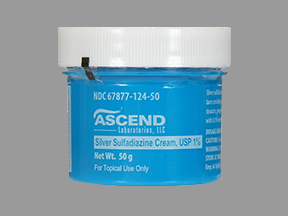
Silvadene Coupons & Savings Card – Discount Prices from $6.00
Brand for: Silver sulfadiazine
My prescription
Edit
25GM of 1%, Silver Sulfadiazine (1 Bottle)
Select pharmacy

CVS
$21.00
COUPON PRICE
Walmart
$6.00
COUPON PRICE
Albertsons
$7.37
COUPON PRICE
Walgreens
$9.09
COUPON PRICESilvadene savings card
Show this card to your pharmacist
Walmart
$6.00
BIN
ID
PCN
GRP
019876
LHF9952F6F
CHIPPO
LHX
Powered by
Related sulfa antibiotics prescriptions
Related sulfa antibiotics prescriptions
Silvadene (Silver Sulfadiazine) dosage forms
Dosage Quantity Price from Per unit 20GM 1 Tube $5.30 $5.30 20GM 2 Tubes $8.10 $4.05 20GM 3 Tubes $10.90 $3.63
| Dosage | Quantity | Price from | Per unit |
|---|---|---|---|
| 20GM | 1 Tube | $5.30 | $5.30 |
| 20GM | 2 Tubes | $8.10 | $4.05 |
| 20GM | 3 Tubes | $10.90 | $3.63 |
Why is Silvadene no longer recommended?
Silvadene (silver sulfadiazine) is not recommended as frequently as it once was due to concerns about potential side effects and the availability of more effective alternatives. It can delay wound healing, cause allergic reactions, and lead to the development of resistant bacteria. Additionally, newer treatments may offer better outcomes with fewer complications. It is important for patients to consult with their healthcare provider for the most appropriate treatment options for their specific condition.
What is Silvadene cream used to treat?
Silvadene cream is used to treat and prevent infections in patients with second- and third-degree burns. It helps to reduce the risk of infection and promote healing in the affected areas.
Can you buy Silvadene over the counter?
Silvadene (silver sulfadiazine) is not available over the counter. It requires a prescription from a healthcare provider.
Is silver sulfadiazine better than neosporin?
The choice between silver sulfadiazine and Neosporin depends on the specific condition being treated. Silver sulfadiazine is commonly used for preventing and treating infections in burn wounds due to its broad antimicrobial properties. Neosporin, on the other hand, is typically used for minor cuts, scrapes, and burns to prevent infection. A healthcare provider should be consulted to determine the most appropriate treatment based on the type and severity of the wound.
Is silver sulfadiazine the same as sulfa?
Silver sulfadiazine is not the same as sulfa, but it does contain a sulfa component. Silver sulfadiazine is a topical antimicrobial agent used primarily for preventing and treating infections in burn wounds. It contains sulfadiazine, which is a sulfonamide, a type of sulfa drug. Individuals with a known allergy to sulfa drugs should consult their healthcare provider before using silver sulfadiazine.
